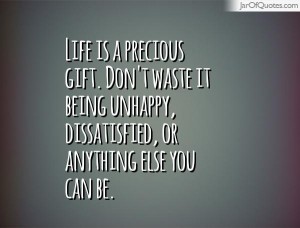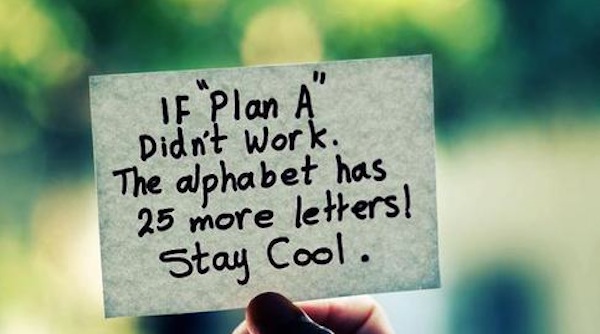When I was in the third standard in school, we had a story about a wise man who tells his king that everything happens for the best. Then one day, the king accidentally cuts off a finger and much to his rage, hears the wisdom from the wise man yet again. The king has the wise man thrown into the dungeons. However, while out hunting, the king comes in close encounter with a lion, rolls over and plays dead. The lion smells the wound on the finger and thinks that the king is dead and moves on. The king is relieved to see his life spared, ponders over what the wise man said and sets him free.
This is just one of the several stories heard since our childhood, teaching us that we should always look for the positive side in any negative situation, take the necessary learnings and move on, thankful that we are living another day in this wonderful life.
Changing how we look at negative events

Negative events are seldom totally serious. It is often our way of looking at them that is paranoid. While events such as death are indeed beyond consolation, most negative events are just annoyances, such as the loss of WiFi signal, recoverable events, such as loss of money or simply unaddressed and ungrounded fear, such as failing to do something because people might think it is odd. Some negative events are awkward such as a wardrobe malfunction or inadvertent consumption of meat as a vegan, but definitely not fatal and the nature of our reaction, be it embarassment, guilt or rage is simply cultural conditioning.
Life as an experiment
One way to look at negative events with objectivity is to follow author Eliyahu Goldratt’s approach. The master of the Theory of Constraints in manufacturing has written several business novels such as The Goal, Critical Chain and The Choice, where the protagonists arrive at brilliant business solutions through simplistic improvements in their approach. Goldratt treats his own life like a laboratory and his actions as crucibles. If his actions succeed, he feels happy, journals them and tries to make the actions a habit. If he fails, he still journals them, draws lessons from his failure, tweaks his actions and retries. He has no inhibitions about failure, nor a lingering sense of guilt or anger. We can all give Goldratt’s method a try. Just bring out the test tubes and get ready to experiment.
Life as a journal
Priya, my wife, often resorts to writing down her thoughts when her thinking is fussy due to frustration. Finding the right words to put down on paper forces your brain to think harder, bring clarity and look at things with more objectivity. I have seen her fuming, start writing and a few moments later, completely calm.
Life as a gift

Isha Foundation‘s founder, Sadhguru Jaggi Vasudev answers a lot of questions from followers, critics and those in need of hope. However one of his most common patterns happens to be the following. Often a person is frustrated about his/her job, boss, nasty people among family or friends or about his/her life in general. The Sadguru begins by saying that most of the anger is because of expectations that people have from their lives and these expectations form when people put themselves as the centre of a universe where things are expected to align with what they want. He then begins an exercise in humility which helps change the pupil’s perspective. Everyday, there are approximately a million people who won’t live to see the next day. If we were to imagine that every person on average has 10 people who hold him/her dear, then at ten million people lose someone who is very close to him/her everyday. So, for every morning we and our most loved ones wake up, we have been given a gift of life with our most cherished ones and that gift is too precious to be squandered away in negative thoughts and in thoughts about things out of our control.
Adversity as an opportunity
Author of self-help and life organisation books like Platform and Living Forward and the owner of the podcast This is Your Life, Michael Hyatt talks about his favourite question when faced with adversity: What does this make possible? When he broke his leg and was bed-ridden, he was despondent at first. However when he went through his magic question, he got a new perspective. He got a lot done for his book draft and website during this downtime. This principle is described in beautiful detail in Ryan Holiday’s bestseller book Obstacle is the way.
Some personal stories
Here are some events from my own life, where I had a refreshingly positive view of events and then some, where I was reminded that the events were actually positive.
On a trip to Rishikesh recently, Priya got sick with fever and joint pain. I could see that she was really miserable, wasn’t interested in food and wasn’t the least enthused about going out of our hotel room. However some turn of events happened that night. We went to the restaurant attached to the same hotel for dinner and Priya agreed to accompany and have at least a little serving to keep her strong. I had the majority of our bowl of fried rice. But the moment I finished it, I felt really nauseous and told a concerned Priya about it. I don’t know what happened in a couple of minutes that followed, but I remember Priya shaking me as I was slumped against the wall. I had passed out for a couple of minutes for reasons I have no idea about (food poisoning maybe, the effects of heat from our morning mini trek maybe). However, Priya seemed to get all her strength back and all her sickness was gone. In a moment of crisis, her body had fought back to full fitness. Next morning, we both went bungee jumping, as if nothing had happened to either of us. We still laugh and will continue to laugh at the incident for years to come 🙂
I have always been a light sleeper and even the sound of rustling pages in a book can wake me up. My total effective sleep per night is generally about 3-4 hours. Upto recently, I was not very happy about it. Although I am fighting fit and perform at peak for most of the day, I thought that I was robbed of good sleep and was pretty sure that my day’s performance could be better, if only I could sleep better. Then I came across a video by Isha Foundation, where the Sadhguru addressed a woman who was asking how she could improve the quality of her sleep. The Sadguru clarified that the human body needs REST and not necessarily SLEEP. The body must consume less energy and be at ease at all times of the day. If so, then the human body actually doesn’t need the kind of sleep that scientists have long been advocating, i.e. 7-8 hours a day. A rested body needs only a couple of hours of complete shutdown if we treat it well throughout the day. Ever the positive thinker, I applied the converse theory 🙂 If my body doesn’t want to sleep well, then maybe I must be treating it well throughout the day and keeping it rested and optimum. Thus I concluded and never again will I question my sleep deficiency 😀
I haven’t had the most cordial of exits from any of my three corporate jobs, but every time I was looking at a much bigger career opportunity than what the old job offered me and so I welcomed taunts, threats to my future career, criticism, unpaid final salaries and unresolved tax compensations with a big smile on my face. I am now extremely happy as a software freelancer working on projects that I really find interesting and can call my time my own.
Conclusion
How do you react when you face negative events and adversities? Do you find your reactions justified after you give it a week to think over? Or maybe a month? How do you cope with adversities in your life? Let me know in the comments.

We all will have to face adversity at sometime or other…Great tools !!
Hey Priya, yup, these are mainly tools crafted from a change of attitude towards adversity 🙂